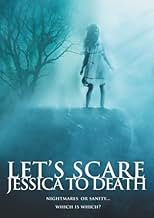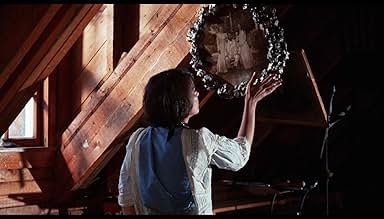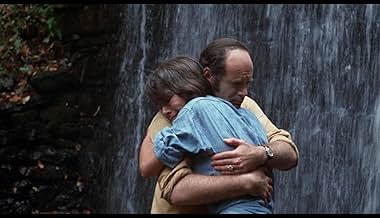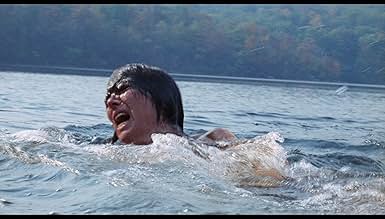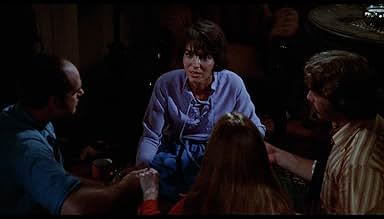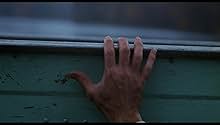ÉVALUATION IMDb
6,4/10
9,9 k
MA NOTE
Après avoir emménagé dans une ferme apparemment hantée où elle vit d'étranges expériences, une femme fraîchement sortie d'une clinique psychiatrique craint de replonger dans la folie.Après avoir emménagé dans une ferme apparemment hantée où elle vit d'étranges expériences, une femme fraîchement sortie d'une clinique psychiatrique craint de replonger dans la folie.Après avoir emménagé dans une ferme apparemment hantée où elle vit d'étranges expériences, une femme fraîchement sortie d'une clinique psychiatrique craint de replonger dans la folie.
- Director
- Writers
- Stars
Avis en vedette
A haunting piece of work that has stuck with me since I fist saw it in the seventies. I wont give any elements of the plot away but you will always remember the whisper "Jessica". Fairly low budget, lacking effects and production and it is one of the creepiest/eerie films in ages. A must see. No real gore. No Monsters or mutants just psychological haunting
If you can ignore the basic and sometimes crappy production values, you can expect a surprising good movie. This is a B movie after it shows in some of the dialogue. Don't let that distract you.
At times very slow moving and some would say quite boring to the point where a lot of people would turn it off.......DON'T. The last 30 minutes of so makes up for the whole movie and for me made it worth watching to the end.
Really good performances from Zohra Lampert and Mariclare Costello, neither of whom I had never heard of until I watched this. The rest of the actors are a bit wooden, but that could easily be blamed on the script and dialogue.
The really great thing about this movie is that the ending is completely open to interpretation. Did it all happen or was it all the imagination of a really messed up mind?
If you don't mind old movies with low production values this is one worth watching.
An easy 7/10 for me, well worth the 90 minutes.
At times very slow moving and some would say quite boring to the point where a lot of people would turn it off.......DON'T. The last 30 minutes of so makes up for the whole movie and for me made it worth watching to the end.
Really good performances from Zohra Lampert and Mariclare Costello, neither of whom I had never heard of until I watched this. The rest of the actors are a bit wooden, but that could easily be blamed on the script and dialogue.
The really great thing about this movie is that the ending is completely open to interpretation. Did it all happen or was it all the imagination of a really messed up mind?
If you don't mind old movies with low production values this is one worth watching.
An easy 7/10 for me, well worth the 90 minutes.
I wouldn't expect such a luridly titled horror film to be as multi-layered as LET'S SCARE JESSICA TO DEATH is. JESSICA is first and foremost a psychological drama of rural paranoia but the marginal use of the living dead in the final act (or at least a vague version of them left unexplained by the film) is worth noting for one reason: the 'living dead' films (and I use the term very loosely here) that followed in NIGHT OF THE LIVING DEAD's wake in the early 70's were a lot more interesting and innovative (even if the executions often left a lot to be desired) than the typical "zombie" flicks that followed DAWN OF THE DEAD and more or less solidified what a 'zombie flick' is supposed to be.
What distinguishes the two eras is the bitter aftertaste of the hippie dream gone bad, the chemical hangover of the age of Aquarius crushed under the weight of its own hopes, one tab of LSD at a time. The titular heroine in JESSICA is taken to a remote countryhouse by her musician husband and his friend, to recover from a psychotic episode she suffered six months ago in New York. On arriving in the small village, they are greeted with hostility by the creepy old men that inhabit it ("damned hippies!"), and discover a young girl living in the house. They invite her to stay with them for a while but she quickly becomes romantically entangled with both men, while Jessica spends her time trying to hold onto her sanity which is not helped by apparitions of a girl in a white gown.
JESSICA at its heart is a moving psychodrama about a woman trying to hold onto her sanity as the world around her bears her false witness. When Jessica discovers the young girl living in the house but still needs her husband's confirmation that the girl is real and not a figment of her imagination ("it's okay, I saw it too Jess") we realize she's "broken before a frozen god" (to use Cormac McCarthy's words).
But even in 90 minutes running time, relatively unknown director John Hancock finds place in his movie for commentaries on small-town hostility, extra-marital drama, post-hippy broken dreams (the two men and Jessica arrive in the small time driving a hearse with the peace symbol stenciled on the side) and an intriguing mix of ambiguous supernatural horror and psychological drama that recalls some of the best moments of the genre, from THE HAUNTING to the works of Jacques Tourneur in the 40's. As Jessica mutters to herself in one of the many monologues delivered with a close-miked intimacy that almost makes us voyers of her psyche: "Madness and sanity, dreams and reality. I don't know which is which." If there are plot inconsistencies and threads unresolved (not least of all the white-gowned girl - which was added on the script on demand by the producers), they are overshadowed by the mesmerizing effect of the entire movie. Pivotal in the film is Zohra Lampert's stunning performance as Jessica, carrying with her the fragile air of a person who is trying to pass for normal but also a genuine love for life. As with Robert Altman's heroines in his psychodrama 3 WOMEN, Hancock has only sympathy for Jessica's drama. To quote Stephen Thrower, "Jessica walks with the gauche fragility of a doll hoping to pass for human; her movements are cautious re-enactments of grace, an approach well suited to the role of an intelligent, sensitive woman recovering from a nervous breakdown". It is truly an Oscar-worthy tour-de-force and definitely far and above the acting usually associated with low-budget horror films.
What distinguishes the two eras is the bitter aftertaste of the hippie dream gone bad, the chemical hangover of the age of Aquarius crushed under the weight of its own hopes, one tab of LSD at a time. The titular heroine in JESSICA is taken to a remote countryhouse by her musician husband and his friend, to recover from a psychotic episode she suffered six months ago in New York. On arriving in the small village, they are greeted with hostility by the creepy old men that inhabit it ("damned hippies!"), and discover a young girl living in the house. They invite her to stay with them for a while but she quickly becomes romantically entangled with both men, while Jessica spends her time trying to hold onto her sanity which is not helped by apparitions of a girl in a white gown.
JESSICA at its heart is a moving psychodrama about a woman trying to hold onto her sanity as the world around her bears her false witness. When Jessica discovers the young girl living in the house but still needs her husband's confirmation that the girl is real and not a figment of her imagination ("it's okay, I saw it too Jess") we realize she's "broken before a frozen god" (to use Cormac McCarthy's words).
But even in 90 minutes running time, relatively unknown director John Hancock finds place in his movie for commentaries on small-town hostility, extra-marital drama, post-hippy broken dreams (the two men and Jessica arrive in the small time driving a hearse with the peace symbol stenciled on the side) and an intriguing mix of ambiguous supernatural horror and psychological drama that recalls some of the best moments of the genre, from THE HAUNTING to the works of Jacques Tourneur in the 40's. As Jessica mutters to herself in one of the many monologues delivered with a close-miked intimacy that almost makes us voyers of her psyche: "Madness and sanity, dreams and reality. I don't know which is which." If there are plot inconsistencies and threads unresolved (not least of all the white-gowned girl - which was added on the script on demand by the producers), they are overshadowed by the mesmerizing effect of the entire movie. Pivotal in the film is Zohra Lampert's stunning performance as Jessica, carrying with her the fragile air of a person who is trying to pass for normal but also a genuine love for life. As with Robert Altman's heroines in his psychodrama 3 WOMEN, Hancock has only sympathy for Jessica's drama. To quote Stephen Thrower, "Jessica walks with the gauche fragility of a doll hoping to pass for human; her movements are cautious re-enactments of grace, an approach well suited to the role of an intelligent, sensitive woman recovering from a nervous breakdown". It is truly an Oscar-worthy tour-de-force and definitely far and above the acting usually associated with low-budget horror films.
No need to repeat the plot. Despite a catch-penny title and a no-name origin, this is a spellbinding horror film. It's also a work of considerable subtlety that doesn't tip its hand in obvious ways. I can see why many dislike the results—the title promises one thing, whereas the results amount to something else. Then too, it's slowly paced, depending more on mood and morbid interest than the more familiar mayhem and gore. Nonetheless, the overall effect tends to be cumulative, such that once you're drawn in, you can't let go. And judging from the number of comments on the Message Board, it's a seductive film, indeed.
Making the main character (Lampert) a recovering mental patient places an overriding ambiguity at the story's center—how many of her creepy experiences are real and how many are imagined. My take is that most are real, whereas the whispers are imagined. But no interpretation, I believe, can be conclusive, which is how it should be for a film like this.
To me psychological horror is much more effective than the palpable kind, since imagination is scarier than obvious blood and gore. The reviewer who likens mood and predicament here to Bergman's highbrow Hour of the Wolf (1968) makes an apt comparison despite the difference in pedigree. There's also a lot of 1940's horror-meister Val Lewton here, as well.
It's hard to say enough about Lampert's beguiling performance. It's also one reason the film's so seductive. I'm just sorry she didn't have more of the headline career her talent deserves. Anyway, the movie came as a happy surprise. Because I was fooled by the exploitative title, I did have to watch it a second time in order to try to put the various threads together. Despite the budgetary lapses, the movie can hold its own with such atmospheric classics as The Other (1972) and Don't Look Now (1973). So don't miss it, unless you want things spelled out in tidy fashion.
Making the main character (Lampert) a recovering mental patient places an overriding ambiguity at the story's center—how many of her creepy experiences are real and how many are imagined. My take is that most are real, whereas the whispers are imagined. But no interpretation, I believe, can be conclusive, which is how it should be for a film like this.
To me psychological horror is much more effective than the palpable kind, since imagination is scarier than obvious blood and gore. The reviewer who likens mood and predicament here to Bergman's highbrow Hour of the Wolf (1968) makes an apt comparison despite the difference in pedigree. There's also a lot of 1940's horror-meister Val Lewton here, as well.
It's hard to say enough about Lampert's beguiling performance. It's also one reason the film's so seductive. I'm just sorry she didn't have more of the headline career her talent deserves. Anyway, the movie came as a happy surprise. Because I was fooled by the exploitative title, I did have to watch it a second time in order to try to put the various threads together. Despite the budgetary lapses, the movie can hold its own with such atmospheric classics as The Other (1972) and Don't Look Now (1973). So don't miss it, unless you want things spelled out in tidy fashion.
The lurid title could easily side-track you from what is essentially an extremely frightening exploration of a woman's descent into madness. You can read it, of course, in a material sense as the title suggests; but everything in this film has the potential to signify something else entirely, and its this ambiguity that makes this film so macabre and interesting. Everything, from the killing of the 'mole' to the conclusion where Jessica is trapped in the middle of a lake on a barely floating boat, could be signifying or at least implying something else. Classic metaphors for the human consciousness are bodies of water; being trapped in one or drowning metaphors for madness. The films ambivalent set of monsters, from a strange set of undead elderly villagers to sexually promiscuous vampires, threaten Jessica and her sanity. The fact that there is no ultimate explanation for the strange set of phenomena that take place is also demonstrative of the horrific and inexplicable quality of psychotic behaviour for those suffering from schizophrenia (for those of us that have had the misfortune to experience it) or the side-effects of drugs. This film is really worth seeing
Le saviez-vous
- AnecdotesOn the first night that the film crew arrived at the farm house location, an eerie fog rolled into the area. They quickly made use of this by shooting the outside of the house as this happened, and that footage was used for transitions throughout the film.
- GaffesWhen Duncan hands Jessica the "mole" in the cemetery scene, it can be clearly seen that it is a field mouse and not a mole.
- ConnexionsFeatured in Cinemacabre TV Trailers (1993)
Meilleurs choix
Connectez-vous pour évaluer et surveiller les recommandations personnalisées
- How long is Let's Scare Jessica to Death?Propulsé par Alexa
Détails
- Date de sortie
- Pays d’origine
- Langue
- Aussi connu sous le nom de
- The Secret Beneath the Lake
- Lieux de tournage
- First Church Cemetery, Town Street, East Haddam, Connecticut, États-Unis(cemetery in beginning of film & where Jessica finds mole)
- sociétés de production
- Consultez plus de crédits d'entreprise sur IMDbPro
Box-office
- Budget
- 250 000 $ US (estimation)
- Brut – à l'échelle mondiale
- 823 $ US
Contribuer à cette page
Suggérer une modification ou ajouter du contenu manquant

Lacune principale
By what name was Let's Scare Jessica to Death (1971) officially released in Canada in English?
Répondre

